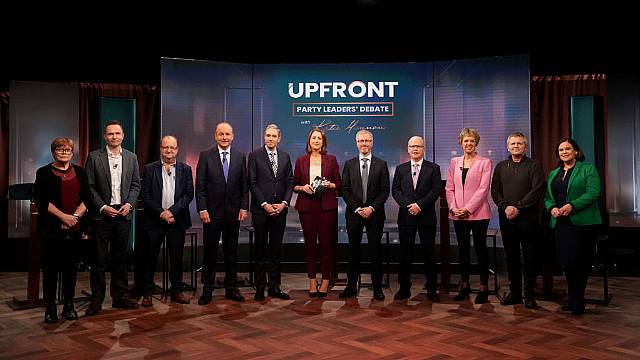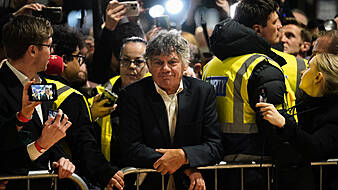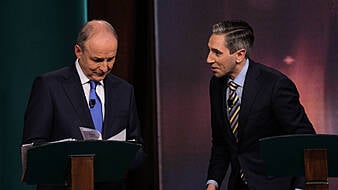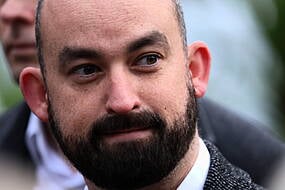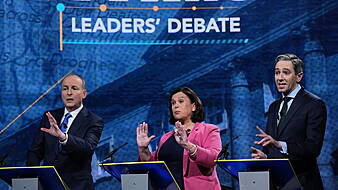Ten party leaders are taking part in the first televised leaders’ debate of the election campaign.
RTÉ is hosting the debate between Fine Gael's Simon Harris, Fianna Fáil leader Micheál Martin, Green Party leader Roderic O’Gorman, Sinn Féin president Mary Lou McDonald, Labour leader Ivana Bacik, People Before Profit’s Richard Boyd Barrett, Independent Ireland’s Michael Collins, Aontú leader Peadar Tóibín, and Joan Collins of Right to Change.
The Social Democrats’ deputy leader Cian O’Callaghan is stepping in for leader Holly Cairns, who is due to give birth this week.
Journalist Katie Hannon drew names randomly to decide which podiums the leaders are using in the studio. RTÉ said the debate between the 10 party leaders would be the "largest-ever" to take place on Irish television.
Tonight we host a 10-person leaders' debate, covering the key issues of the #Election24 campaign.
Here is the draw for where each person will be standing in the studio.
The debate begins at 9.35pm on @RTEOne.#rteupfront pic.twitter.com/IH9gE7YJa0— Upfront with Katie Hannon (@RTEUpfront) November 18, 2024
Advertisement
Speaking ahead of the debate, Mr Harris said: “There’s not nearly enough focus being paid in this election debate to the economy. I personally think there should be a debate scheduled on the economy.
“There’s lots of discussions about how to spend money, not nearly enough discussion in relation to the economy.”
Asked whether Fine Gael was trying to give out policies in their manifesto “for everyone in the audience”, Mr Harris said “not at all”.
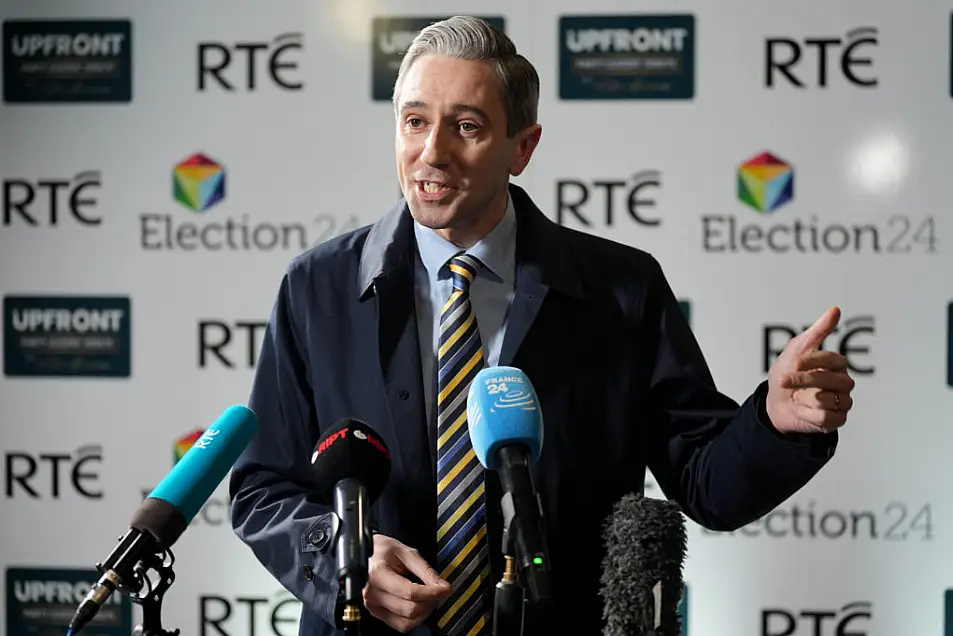
Tánaiste and Fianna Fáil leader Micheál Martin said he hoped the debate would involve a focused discussion on housing.
He also aimed criticism at Sinn Féin for failing to publish its manifesto ahead of the debate.
“Hopefully we can debate substance and the basis of our manifestos, those of us that have published manifestos. It’s disappointing that other parties haven’t in advance of a national debate tonight, but I’m looking forward to it,” he told reporters arriving at RTÉ.
Sinn Féin president Mary Lou McDonald rebuffed criticism from Fine Gael and Fianna Fáil over the fact her party has not published its manifesto prior to tonight’s TV event.
“I think much of that criticism was coming from people who actually were looking to cog our homework and steal our policies,” she said. “I know that imitation is the sincerest form of flattery, so one can only be flattered by the attentions of Fine Gael and Fianna Fáil but they really should go and get some ideas of their own really, you know.
“And we will publish our manifesto tomorrow morning. You’ll know that we’ve spent now five months publishing very, very detailed work in the areas of housing, and health, and childcare, immigration and international protection, mental health, disability. We’ve done a huge amount of work, and we look forward to publishing the manifesto tomorrow. You’ll all get to see the plan there.”

Green Party leader Roderic O’Gorman said he would retain his seat as he arrived at RTÉ headquarters for the first televised debate of the election.
“I’m confident of retaining my seat. It’s always a battle in Dublin West, but I look forward to holding that seat and proving [political commentator and former Fine Gael minister] Ivan [Yates] wrong.”
Labour leader Ivana Bacik and Social Democrats deputy leader Cian O’Callaghan have both called the rows between Fianna Fáil and Fine Gael in recent days a “phony war” on their way into RTÉ’s TV debate.
“I think that until now, the first week of the election campaign has been dominated by a sort of contrived conflict, a scripted scrap between two parties that have, in fact, been governing together for the best part of a decade,” Ms Bacik said.

“I think that’s been somewhat disrespectful to many voters. Certainly what I’m hearing on doors is people feeling rather frustrated and indeed irritated by the phony war that’s gone on.”
Mr O’Callaghan said: “They are now for these few weeks, pretending to be loggerheads with each other. So I think tonight is an opportunity for us to actually discuss some of the real issues facing people in this country.”
Aontú leader Peadar Tóibín said there has been a “high octane sugar-rush” of promises and believed the leaders' debate will change the dynamic of the election.
“One of the reasons why this election has been so flat at the moment is there has been very little exchange of real ideas,” he said ahead of the debate. “A lot of the election campaigning seems to be out of a marketing box, literally high-octane sugar-rush promises etc, just to kind of befuddle people and what we actually need is a discussion on where this country is going.”
Joan Collins of Right To Change said similar, arguing that she wanted to change the course of the discussion about “fundamental issues in housing and health” rather than Fine Gael and Fianna Fáil’s “goodies for everybody”.
Asked about whether it would be hard to get a hearing in a debate with nine other people, she said: “It will but I’ll fight my corner.”
People Before Profit leader Richard Boyd Barrett said that people are “demoralised” at the idea of Fianna Fáil and Fine Gael re-entering government again.
Independent Ireland leader Michael Collins said they understand if they go into a coalition government, “we’re not going to get everything across the line”.
“I know that we’re not. But if they’re not going to work with us to create solutions for to make lives easy for these people? Well, we’re off that table. We are going to be the opposition.”

The debate is taking place in the second week of a short, three-week general election campaign.
More than 680 general election candidates are running for the Dáil across the State’s 43 constituencies.
The deadline for nominations passed at the weekend and returning officers have now published the final list of candidates in each area.
All parties bar Sinn Féin and the Social Democrats have published their general election manifestos, making pledges on housing, childcare and on how to spend the €14 billion Apple tax money.
